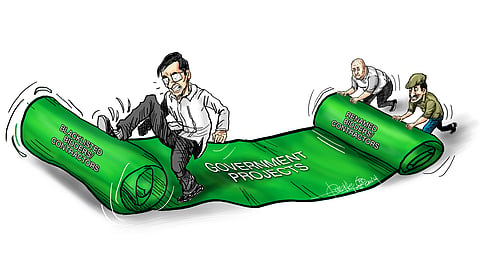
- NEWS
- the EDIT
- COMMENTARY
- BUSINESS
- LIFE
- SHOW
- ACTION
- GLOBAL GOALS
- SNAPS
- DYARYO TIRADA
- MORE

With much fanfare, then Department of Public Works (DPWH) and Highways Secretary Mark Villar heralded in October 2020 the creation of a Task Force Against Graft and Corruption (TAG) to probe allegations of widespread anomalies in the agency.
The move came after President Rodrigo Duterte ranted about “massive” corruption in the DPWH amid the Build, Build, Build infrastructure boom. Villar directed the body to act on Duterte’s claim that no DPWH project was started without an illegal transaction.
Until Villar stepped down in 2022 to run for a Senate seat, the supposed anti-graft body did not report any accomplishments, suggesting it was formed merely as a face-saving move.
An official of a major builder who often deals with the government on key projects said that Villar would know how the corruption network runs even without the fancied TAG.
The DPWH secretary has full authority to assign personnel, including district engineers, unless Malacañang overrides the assignments, which rarely happens.
Legislators, however, exert pressure and influence in the assigning of “favorite” district engineers to gain control of the “pet projects” funded by their insertions in the annual budget.
The results are the dilapidated and substandard projects that are repeatedly rebuilt yearly. After a downpour, potholes and clogged drainage are a common sight, proving the sloppy construction that was meant mainly to collect kickbacks.
Contractors who were previously blacklisted and had their registrations revoked emerge, with a different name, as favored bidders.
The contractor said that during the term of Villar, “political intervention” was the norm, thus discouraging good and honest contractors from bidding for public projects, particularly in regions outside urban centers.
In many areas controlled by politicians for long periods with their family members, backroom deals among the local executives, builders and DPWH engineers are the rule rather than the exception.
The tong-pats, or amount on top of the actual project cost to accommodate commissions of about 12 percent of the contract price, gave way to the taripa (tariff) system allegedly under Villar, which was a fixed rate that went up to 10 percent of the project cost.
The contractor said that in all, about 20 percent of a project cost went to kickbacks, leading to poorly constructed infrastructure. Of course, contractors are also required to contribute to the campaign kitties of local candidates.
The wheeling and dealing for government projects involves those who have a direct hand in them, such as functionaries in City Hall who grant the permits for the projects to start.
The dealers make sure the theft of public money does not leave a trail and is done behind closed doors.
So-called “joint venture” agreements are resorted to as a legal route for subcontractors to participate in huge contracts. These small firms are allowed to use the licenses of the big contractors.
The big contractor deals with the government and the distribution of the payoffs while the small contractor implements the actual construction.
A “royalty fee” of two to five percent of the total contract price is then paid to the holder of the government contract.
The public ends up with a substandard project that is exploited as a campaign tool by local politicians who make it appear the project was their commitment to public service.
DPWH officials know how the mafia of corruption is deeply ingrained in the agency and its heads, former and current, have done little to end its greedy reign.
